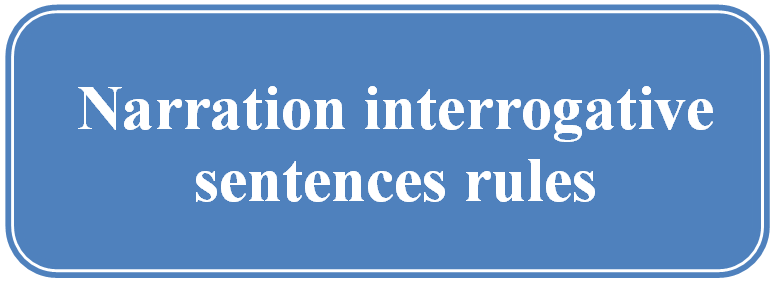
Narration interrogative sentences rules
An interrogative sentence is a sentence that asks a question. When converting interrogative sentences into indirect speech, we need to follow some rules.
Rule – 01: If the reported speech is an interrogative sentence, reporting verb changes to ask/asked, inquire of, want to know, demand/wonder, etc.
Rule – 02: If the reported speech begins with auxiliary verbs (i.e. do, does, did, shall, will, am, is, are, was, were, can, may, etc.), ‘if/whether’ is to be placed before reported speech instead of ‘that’.
That means reported ‘yes/no‘ questions have if or whether.
Example :
Direct: Daniel said, “Is there a cafe nearby?”
Indirect: Daniel asked if/ whether there was a cafe nearby.
Direct: “Can we take photos?”
Indirect: The visitors want to know if/whether they can take photos.
Direct: “Has the bus arrived yet?”
Indirect: Someone was wondering if/whether the bus has arrived yet.
Rule – 03: The sentence (reported speech) is converted to an assertive sentence instead of an interrogative one. The change of tense and person remains the same as before.
Example :
Direct: Bithi said to Rith, “ Have you eaten rice?”.
Indirect: Bithi asked Rithi if she had eaten rice.
Direct: The man said to me, “Do you know my name.?”
Indirect: The man asked me if I knew his name.
Direct: Sam said to Biva, “Will you do it?”
Indirect: Sam asked Biva if (whether) he would do it.
Direct: We said to them, “Can you do it?”
Indirect: We asked them if they could do it.
Direct: “Can you operate a computer ?”
Indirect: They asked me if I could operate a computer.
Rule – 04: If the reported speech begins with interrogative words such as: who, whom, whose, what, which, why, where, how, where, etc., ‘if/whether’ does not sit before the reported speech, wh-word sits there instead.
Rule – 05: In this case, the sentence will be in assertive form.
Rule – 06: Changes in Tense and Person remain the same as before.
Example:
Direct: Gita said to Rita, “What have you eaten at night?”
Indirect: Gita asked Rita what she had eaten at night.
Direct: Father said to me, “ Why will you do it?”
Indirect: Father asked me why I would do it.
Direct: I said to him, “What is your name?”
Indirect: I asked him what his name was.
Direct: “How can we find out?”
Indirect: I was wondering how we can find out.
Direct: “Which way is the post office?”
Indirect: Someone wants to know which way the post office is.
Narration interrogative sentences rules
Related term:
